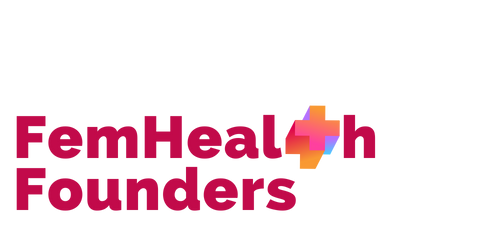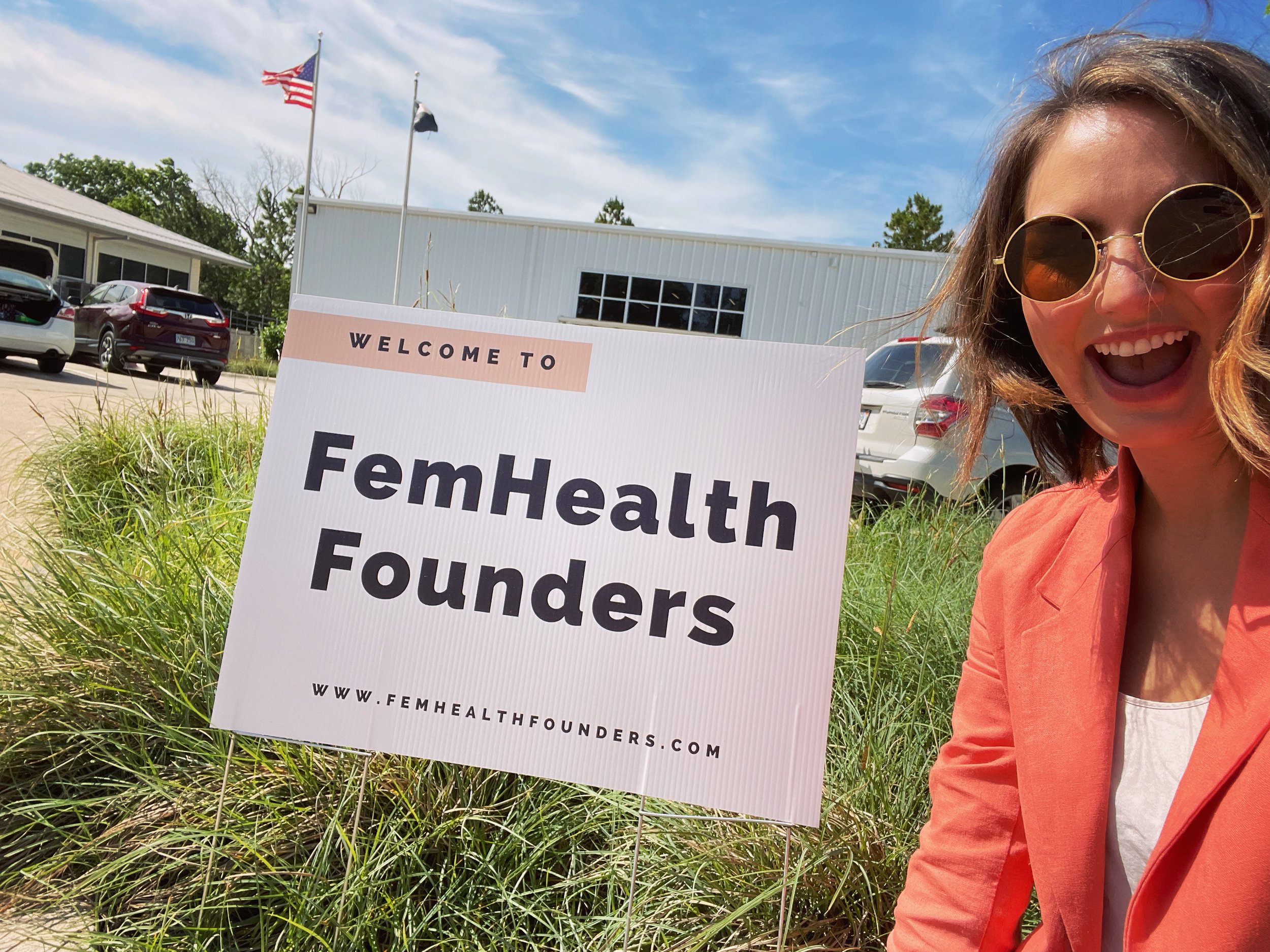Roundtable Recap
This article shares highlights from the Women’s Health Innovation Roundtable on June 15, 2022. Below, you’ll read about our panelists’ insights into innovation, discussions from the audience, data that was uncovered during the event, and the full recording of the roundtable can be found at the very end. Enjoy this recap and we hope to see you at our next roundtable. Please reach out if you’re interested in partnering with or sponsoring our organization.
When Elizabeth, April, and I met for the first time in a co-working space in Fayetteville, we talked for over two hours like old friends. Our conversations frequently turned to two main themes:
the disparities and inefficiencies in women’s health; and
the many challenges we’ve faced as entrepreneurs in the femtech space.
We all agreed that being passionate and motivated to provide better health solutions for women isn’t enough when the odds are fundamentally stacked against women founders. Even more pronounced is the lack of medical innovation and basic research on female-specific conditions and symptoms.
When we dreamed up FemHealth Founders, we knew these issues were looming concerns for many, but we weren’t sure how we should go about tackling them. We decided we needed to start with a conversation, just like we did when we first got together.
The three of us put our heads together and organized a community roundtable. 92 people RSVP’d to the hybrid in-person/virtual event at the University of Arkansas Collaborative, who graciously donated the space. Attendees ranged from medical practitioners to business leaders, with diverse representation across the founder, investor, healthcare, and community nexus.
Roundtable Opening
The conversation started with an overview of FemHealth Founders:
Who are we? A women-led, women-centric innovation hub in the Heartland.
What is FemHealth? Any condition, disease, symptom, situation, or status that uniquely, singularly, or differently affects women.
What do we do? We are a resource convener for FemHealth innovation, cultivating validation, mentorship, and investment in women’s health and wellness.
After this overview, we talked with a curated panel of women entrepreneurs and business leaders about their experiences. The panelists included:
April Roy, CEO and Founder, femPAQ Inc.
Canem Arkan, Managing Director, Endeavor Heartland
Rep. Denise Jones Ennett, Arkansas House of Representatives, District 36
Katie Thompson, Executive Director, Science Venture Studio
Kristen Davidson, PT, DPT, Washington Regional / Women’s Health Entrepreneur
Panelists (left to right): April Roy, Canem Arkan, Katie Thompson, Kristen Davidson
Panel Interview
The first discussion centered on women’s health innovation and the lack of female-specific healthcare innovation.
Question: Women's health innovation is projected to be a $75 B market by 2025 (Cision PR Newswire, 2021). Yet only 1 percent of healthcare innovation and research is invested in female-specific conditions (beyond oncology) today (KFF, 2020). What do you see as the biggest hurdles for women who want to participate in that market?
“As a community, we fundamentally must change how we think about women and remove bias. Women face unique and specific health challenges that remain unaddressed. Research and healthcare must catch up. Investors need to open bigger doors to women founders solving these issues. ”
Question: Only 20% of all global startups had a female founder in 2020 (Crunchbase, 2020). In all of history, about 20 women have founded and led a company through an IPO (Business Insider, 2021). In 2021, only 2% of all VC funding went to women across the U.S. (Bloomberg, 2022), and a staggering 0.35% went to Black female founders (Crunchbase, 2022). Talk to us about the most critical challenges women founders face in launching and scaling a high-growth company.
“Women are not accessing resources and funding at the same level as men because they often don’t feel welcome. In 2020, only 15% of all SBIR/STTR grants (federal business award program) went to women-owned businesses. Additionally, women who have young children or elderly family members are disproportionately expected (or feel personal responsibility) to take on the burden of caregiving. This creates major obstacles to the time and energy required to grow and scale a business.”
Question: Women face unconscious bias in almost every corner of their lives, from the doctor's office to the board room. Have you experienced or witnessed bias as a female leader and how did you navigate that situation?
“Being a female CEO and founder often means convincing investors and customers that you really are in charge of the company, scrutiny mainly reserved only for women, especially women of color. We have to work extra hard to prove ourselves, which we ultimately do, and end up performing better than our male counterparts in many instances. ”
Question: From your vantage point, what can stakeholders and changemakers do better to support women (in terms of health and economic empowerment)?
“Infant mortality rates in Arkansas are the third highest in the country. Call your senators about issues that uniquely and negatively impact women and girls. Share your resources if you have them. Elevate women’s health issues that significantly hold them back from prospering in society. ”
Question: The pandemic sparked a mass exodus of women from the workforce (nearly 2 million fewer women in the U.S. labor force post pandemic), highlighting systemic issues for women who want/need to work, and even more compounded for women of color (SHRM, 2022). It is widely accepted that women face a disproportionately high burden to be primary caretakers. What are your thoughts on these issues and constraints and how can we creatively empower women to contribute to our economy in a way that works for them?
“Lack of affordable childcare is by far the biggest hurdle for working women, placing a profound economic burden on society and widen gender parity. Women are disproportionately affected by this barrier so we must come up with better options to keep them contributing to our economy, from employer-covered childcare expenses to universal paid maternity leave.”
Thoughts from the Audience
Our attendees had some great things to say, too…
Women and men alike raised their hands, pledging their support to make a difference and help wherever needed.
Topics from the lack of menopause care in the U.S., to differences in cardiac health among women and men were noted.
One attendee mentioned the need to improve sex education at a policy level, while others expressed concern around not enough women in authority making healthcare policy decisions.
Many conversations centered on the biases women face in the workplace.
Investors noted their commitment to funding more female founders and actively mentoring them along the way.
We even checked in at the end by asking participants some interactive questions.
If you’re a founder or work with founders, what’s holding you back from moving your idea forward?
What’s the number one resource that would help you or the people you work with get to that next step with your idea?
The gaps and opportunities in women’s health and economic growth are tremendous. FemHealth Founders, alongside our community here in the Heartland, are ready to roll up our sleeves and make things happen for women. Are you?
Reach out today if you’d like to be part of FemHealth Founders as a partner, funder, or otherwise. We’d love to hear from you!





